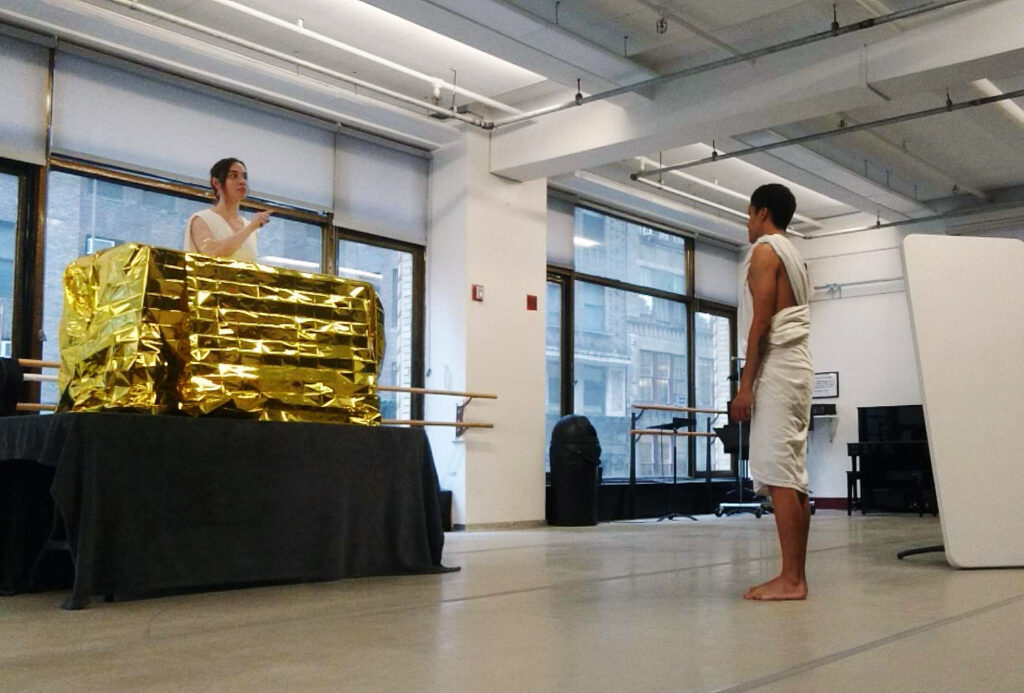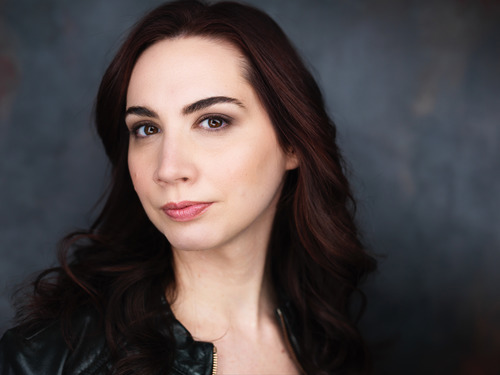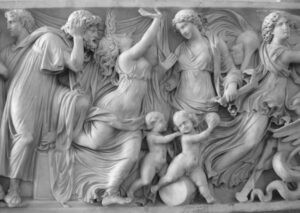Why do I love Medea so much? Maybe it is because it was the first tragedy I translated from ancient Greek when I was 15 years old, or maybe it is because I had always seen her as a very strong character. However, I fell in love with her again, in a completely new way this summer while studying at the Atlantic Acting School.
I remember picking up Euripides tragedy and reading it over again after such a long time and feeling deeply touched, feeling like I understood her at a completely new level. My 15-year-old self wanted to portray Medea because of her forcefulness and her wild and untamed nature. My present-day self wants to portray Medea because she can relate to her plight and she wants to give a voice to Medea’s suffering. My 15-year-old self could see the heroic character of Medea and admired her. She would have said to Medea “Go ahead and get justice”, my young adult self can see her deeply human side and would have given Medea a big hug and told her “You are not alone”.
I guess this is what made me realize why they say that actors become better with the more life experience they gain, because you can understand the characters in a script on a whole different level and depth and this is how you create layers, bringing in your old and your new self.
Specifically, reading it again this year brought me back to when I moved from Italy to Cambridge in the UK to further my studies. I was top of my class in Italy, always had been, but now I had to show my value and build myself from scratch and, in the beginning, there was nobody to whom I could turn when in need. It brought me back to the very first week I was in the UK. I knew nobody and, when I came down with a very high fever and was in great physical pain, I had no one I could ask to come to stay with me and take care of me or even bring medicine to me. I felt scared and alone. When I got there, I knew I had to prove myself and that I had to earn the respect of my peers. It is the same now. Relocating to NYC last year and deciding to start acting again.
Deciding to enroll in the training at the Atlantic Theater, I had a question to answer: could I actually do it?
The journey to that answer it is probably not so different to what Medea must have felt when she boarded Argo. She must have been happy and excited but also afraid of all she was leaving behind to take a chance at a greater happiness. That is how I really fell in love again with Medea this summer, performing at the Atlantic Acting School for their Summer Intensive: because I felt I finally understood who she really was and what the play was really about.

Daniela Lucia and Andres Reyes rehearsing Euripides’ Medea
The play is about immigration and betrayal and the pain that can come with it. The play opens with the nurse speaking about Jason’s betrayal of his wife and kids and his betrayal of the oaths. The nurse highlights the pain Medea is in and how she refuses food and cries over her country and how she misses her family in this specific moment. We hear this pain and the nostalgia for her country from Medea herself in her speech to the Corinthians when she says, “You are here in your own country… I am here alone… I have no mother, no brother, no relative at all…” It is incredible how extremely powerful those words are and how extremely relevant they are in today’s world.
What is interesting is that she does not come from a lower class background. She was a princess in her country. She was royalty. Her high status background heightens her pain. She is someone that does not need to leave but whose actions and choices create a sequence of events that lead her to another country.
When she arrives in Corinth, she is not discriminated by the Corinthians. In fact, she is well accepted and respected for her intelligence and, at a later time, as the tragedy progresses feared for that same intelligence. Which is a mirror of reality, your best qualities could be your worst flaws depending who`’s the judge of it. Despite being respected in the beginning, she still is and feels alone. Leaving her country came at an incredible price. A cost that sky rockets with Jason’s betrayal.
The play is a window into the heart of an expatriate and a risk taker and it is as relevant, if not more so, today as it was in 431 B.C. Especially for a country like the USA that was built on immigration and still is a country of great diversity.

Medea is not just a betrayed woman in pain and an expatriate. She is a hero. Yes, a hero. Because she ends up picking herself up from her original condition and regaining, at least partially, her status by the end of the tragedy. Euripides treats her as hero, not only because amongst all of all the different version of the legend available to him at that time, and that can still be found in the ancient mythographers, he decides to create its own version, where instead of creating a character, such as Clytemnestra, he creates one similar to Sophocles’ Aiace. He positions her as a hero through her behavior and also through the specific language he uses to describe her and has her use throughout the tragedy. Examples of this are “tolma” at 394 and “thrasos” at 856, respectively boldness and daring courage and all the future with the idea of duty that she uses along her speeches throughout the tragedy. He describes her as having “sophe” which it is not just intelligence. It is about Euripides elevating her to the ranks of sophists philosophers!
At the end of the play she appears on top of the palace on her chariot. She has been returned to her demi-god status. She is the deus ex machina. She represents the divine justice. She represents that balance has been reestablished.
About the killing of her children… This is an act that, as brutal as it seems, has to be read in the context of her motives and what this act really represents in the culture at the time. She does not kill them out of vengeance. She kills them to protect them from a miserable future and a miserable death. She knows that with her being exiled, they would be destined to be treated as bastard sons of Jason and who knows what would happen to their dignity and honor. After deciding to pursue the murder of Jason’s new wife, she knows the kids would end up murdered by her enemies…and she cannot afford it. If someone has to kill them it should be her, in order to prevent her enemies to dishonor her children.
In ancient Greece, honor and dignity were more important than being alive. She ensured for her kids the best possible outcome in that situation. She acted out of love for them. By killing them herself she ensured they had proper funeral rituals in Hera’s temple and she ensured that the sacredness of their bodies would be maintained. The killing of the children is also the moment in which Medea breaks free from her final chains. They are the last thing she has to lose and as they say “you become really free when you have lost everything” that is what happened to her. Then she is free to fly away. She has reestablished a sort of balance. She has executed justice “dike” and this is reflected in the choir words at the end 1415 where her actions are justified as divine intervention, as gods actions, “the deeds of the gods appear in many forms…..our expectations may not be granted but the gods will find ways of achieving what we never thought achievable”.
If we want to think about it under a modern standpoint, her motives to kill her children are not so distant to those of a pregnant woman deciding to pursue a therapeutic interruption of her pregnancy. Both Medea and that woman want to prevent a fate that they consider worse than the life the child would have and with this statement I do not want to take a stance on such delicate and personal matters, I just want to push people to understand a point of view on an action. That although it may look violent, could actually have come from a good place.
Medea is much more than a play about vengeance and the actions of a mad woman. In fact, it is much more about justice, immigration and the difficulties and how painful the process can be, and in some respects, strategic thinking. Euripides was a visionary and he had the ability of innovating playwriting back in 431 B.C. and these is shown in creating a character that is more layered and more interesting than a crazed, vengeful woman.
You can go see the upcoming adaptation of the Greek myth starring Rose Byrne at the Brooklyn Academy of Music: Jan 12 – Feb 23, 2020 | Tickets here.


Daniela had her theater debut at the age of 13 she then explored different materials in theater and tv at a regional level in Italy. After a few years experiencing life and training in science she landed in New York and she is now back to theater and acting after finding herself at home at the Atlantic Acting School. She has been trained in classical theater with a strong focus on Greek tragedies, which she loves and which she has also proudly translated, but she does not wish to her worst enemy to have to translate poetry from ancient Greek.

